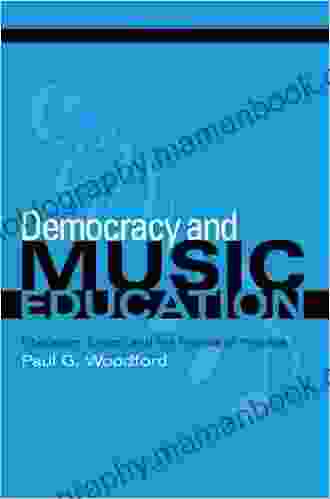Liberalism, Ethics, and the Politics of Practice: Counterpoints

Liberalism is a political philosophy that emphasizes the importance of individual freedom, equality, and democracy. It has been a major force in Western political thought since the Enlightenment, and it continues to be influential in many parts of the world today. However, liberalism is not a monolithic ideology; rather, it is a diverse set of ideas and values that can be interpreted and applied in different ways. This article explores the complex relationship between liberalism, ethics, and the politics of practice. It argues that liberalism is not simply a set of abstract principles, but rather a living tradition that is constantly being shaped by the ethical and political challenges of the day.
4.1 out of 5
| Language | : | English |
| File size | : | 1846 KB |
| Text-to-Speech | : | Enabled |
| Word Wise | : | Enabled |
| Print length | : | 176 pages |
Liberalism and Ethics
Liberalism is founded on the idea that all individuals are equal in moral worth. This means that each person has the same basic rights and freedoms, regardless of their race, gender, religion, or any other characteristic. Liberals believe that these rights and freedoms are essential for human flourishing and that they should be protected by the state.
The ethical implications of liberalism are far-reaching. For example, liberalism implies that we have a duty to respect the rights of others, even if we disagree with them. It also implies that we have a duty to help those who are less fortunate than ourselves. These ethical principles have been used to justify a wide range of political practices, from social welfare programs to affirmative action.
Liberalism and the Politics of Practice
The relationship between liberalism and the politics of practice is complex and contested. Some liberals believe that liberalism is a purely ethical doctrine that should not be used to justify specific political policies. Others believe that liberalism has clear political implications and that it should be used to guide our decisions about how to organize society.
There is no easy way to resolve this debate. However, it is important to recognize that the relationship between liberalism and the politics of practice is a two-way street. On the one hand, liberalism can be used to justify different political practices. On the other hand, the practice of politics can also shape the development of liberalism as an ethical doctrine.
Counterpoints
There are a number of counterpoints to the liberal view of ethics and politics. One common counterpoint is that liberalism is too individualistic. Critics argue that liberalism places too much emphasis on the rights of individuals and not enough emphasis on the responsibilities of citizens. They argue that this can lead to a society that is fragmented and lacking in social solidarity.
Another common counterpoint is that liberalism is too utopian. Critics argue that liberalism's ideals of individual freedom and equality are unrealistic and that they cannot be achieved in the real world. They argue that liberalism is therefore a naive and impractical philosophy.
These are just two of the many counterpoints that have been made to the liberal view of ethics and politics. It is important to consider these counterpoints when evaluating liberalism and its implications for the politics of practice.
Liberalism is a complex and multifaceted political philosophy. It is founded on the idea that all individuals are equal in moral worth and that they have certain basic rights and freedoms. However, the relationship between liberalism and the politics of practice is complex and contested. There are a number of counterpoints to the liberal view of ethics and politics, and it is important to consider these counterpoints when evaluating liberalism and its implications for the politics of practice.
4.1 out of 5
| Language | : | English |
| File size | : | 1846 KB |
| Text-to-Speech | : | Enabled |
| Word Wise | : | Enabled |
| Print length | : | 176 pages |
Do you want to contribute by writing guest posts on this blog?
Please contact us and send us a resume of previous articles that you have written.
 Top Book
Top Book Novel
Novel Fiction
Fiction Nonfiction
Nonfiction Literature
Literature Paperback
Paperback Hardcover
Hardcover E-book
E-book Audiobook
Audiobook Bestseller
Bestseller Classic
Classic Mystery
Mystery Thriller
Thriller Romance
Romance Fantasy
Fantasy Science Fiction
Science Fiction Biography
Biography Memoir
Memoir Autobiography
Autobiography Poetry
Poetry Drama
Drama Historical Fiction
Historical Fiction Self-help
Self-help Young Adult
Young Adult Childrens Books
Childrens Books Graphic Novel
Graphic Novel Anthology
Anthology Series
Series Encyclopedia
Encyclopedia Reference
Reference Guidebook
Guidebook Textbook
Textbook Workbook
Workbook Journal
Journal Diary
Diary Manuscript
Manuscript Folio
Folio Pulp Fiction
Pulp Fiction Short Stories
Short Stories Fairy Tales
Fairy Tales Fables
Fables Mythology
Mythology Philosophy
Philosophy Religion
Religion Spirituality
Spirituality Essays
Essays Critique
Critique Commentary
Commentary Glossary
Glossary Bibliography
Bibliography Index
Index Table of Contents
Table of Contents Preface
Preface Introduction
Introduction Foreword
Foreword Afterword
Afterword Appendices
Appendices Annotations
Annotations Footnotes
Footnotes Epilogue
Epilogue Prologue
Prologue Crystal Senter Brown
Crystal Senter Brown Robert N Macomber
Robert N Macomber Karen Shepley
Karen Shepley Linsey Knerl
Linsey Knerl Cynthia M Heelan
Cynthia M Heelan Kevin Moffett
Kevin Moffett Thomas Thompson
Thomas Thompson Richard Benz
Richard Benz Delicious Tacos
Delicious Tacos Andrei Martyanov
Andrei Martyanov Andrew Knighton
Andrew Knighton Andrew Chaikin
Andrew Chaikin Jason Wilson
Jason Wilson Ruth Welburn
Ruth Welburn Beth Means
Beth Means James Lazareth
James Lazareth Amber Valentine
Amber Valentine Marguerite Yourcenar
Marguerite Yourcenar Georgina Herrera
Georgina Herrera Andrea Maller
Andrea Maller
Light bulbAdvertise smarter! Our strategic ad space ensures maximum exposure. Reserve your spot today!

 Houston PowellA Voyage to Iceland: The Land of Fire and Ice as Seen in Paintings and Poetry
Houston PowellA Voyage to Iceland: The Land of Fire and Ice as Seen in Paintings and Poetry
 Henry GreenTeaching Malcolm X: Popular Culture, Literacy, and the Transformative Power...
Henry GreenTeaching Malcolm X: Popular Culture, Literacy, and the Transformative Power... Camden MitchellFollow ·17.3k
Camden MitchellFollow ·17.3k Edgar CoxFollow ·10.6k
Edgar CoxFollow ·10.6k Denzel HayesFollow ·16.8k
Denzel HayesFollow ·16.8k Edmund HayesFollow ·5.6k
Edmund HayesFollow ·5.6k Mark TwainFollow ·15.7k
Mark TwainFollow ·15.7k Allan JamesFollow ·4.4k
Allan JamesFollow ·4.4k Damon HayesFollow ·18.6k
Damon HayesFollow ·18.6k Dylan HayesFollow ·8.2k
Dylan HayesFollow ·8.2k

 Oscar Bell
Oscar BellDream Keeper II by Parris Afton Bonds: An Exploration of...
Dream Keeper II by Parris...

 Eric Hayes
Eric Hayes100 Ultimate Smooth Jazz Riffs For Violin: Elevate Your...
Welcome to the ultimate...

 Vernon Blair
Vernon BlairAll You Need to Know to Start Investing and Trading...
Binance is...

 Greg Foster
Greg FosterShalott: Into the Unknown
In the heart of medieval...

 Will Ward
Will WardMoney Making Money Instead of You Working: Unleashing the...
In a world where...
4.1 out of 5
| Language | : | English |
| File size | : | 1846 KB |
| Text-to-Speech | : | Enabled |
| Word Wise | : | Enabled |
| Print length | : | 176 pages |









